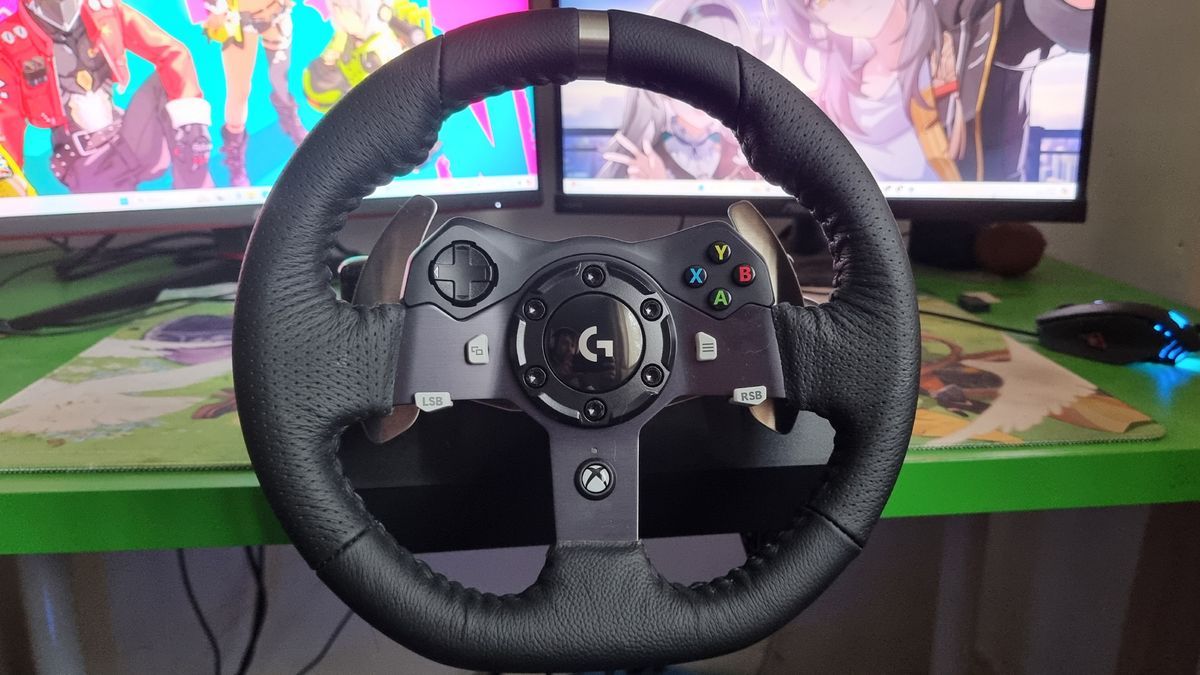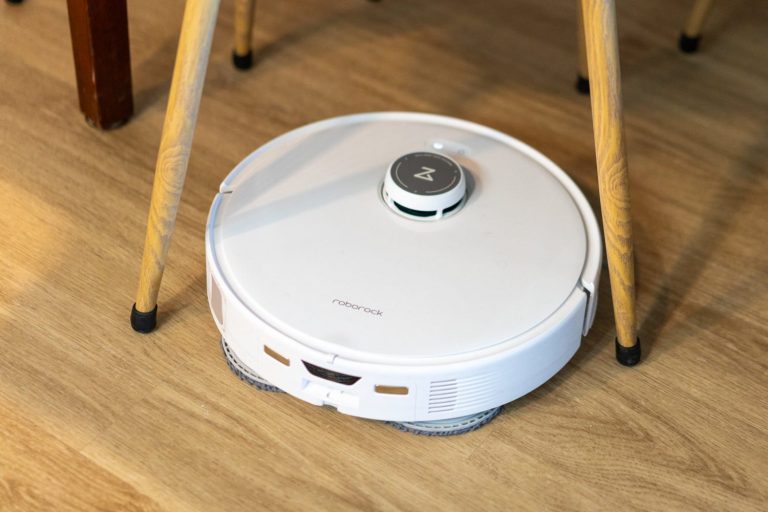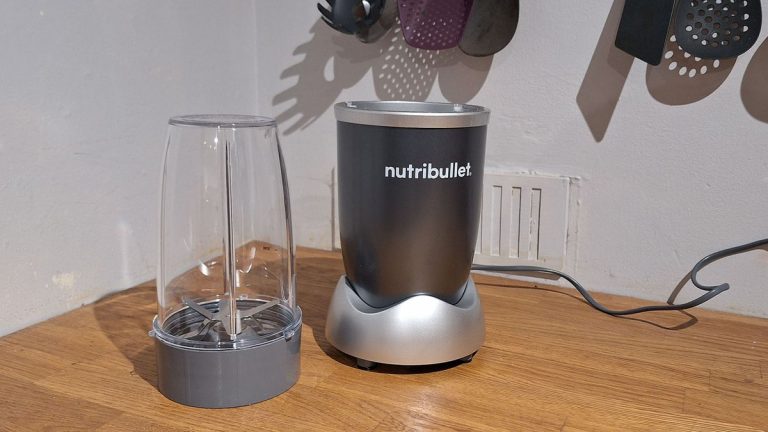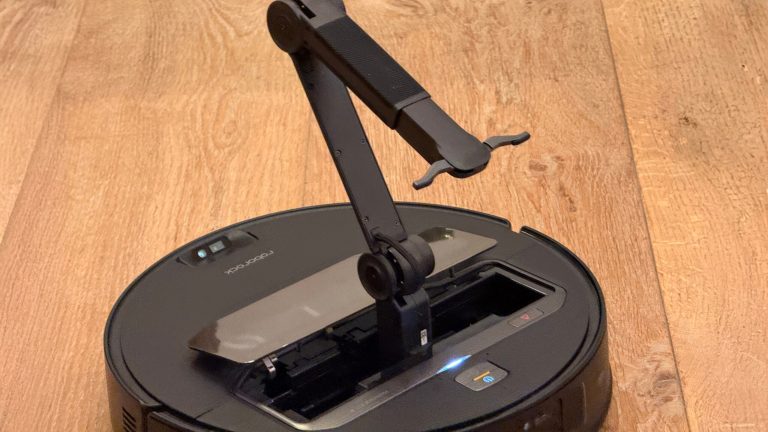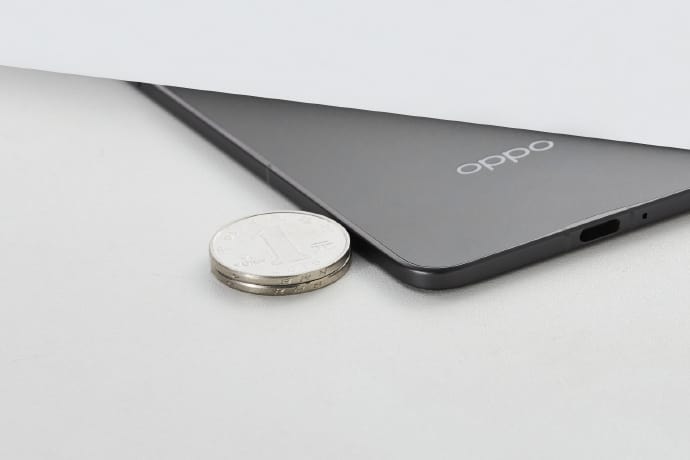The G920 also boasts exceptional build quality, with firm plastic forming the wheel base, pedal floor and the center of the wheel itself where you’ll find the layout of Xbox buttons. The trio of throttle, brake and clutch pedals are crafted from brushed stainless steel, and the leather wrapping around the wheel provides sturdy and comfortable grip.
It holds up performance-wise too, thanks to 900-degree rotation that makes it an excellent choice for the very best racing sims and sim-lite titles like F1 24 , Forza Motorsport and EA Sports WRC. Force feedback from the wheel is pretty strong by default, though this can be adjusted based on your preferences on the PC G Hub software or in games that support force feedback settings.
The only real sticking point – almost literally – is the incredibly stiff brake pedal which certainly isn’t suited for beginners or casual racing enjoyers. It’s the one part of the Logitech G920’s package that you may consider to be a deal breaker. While you can make things a little easier for yourself here by adjusting the pedal’s sensitivity in the G Hub app, those of you on Xbox exclusively will need to rely on settings from game to game.
(Image credit: Future)
Logitech G920: Price and availability
$299.99 / £349.99 / AU$549.95 Pedals are included with purchase Available at Amazon and Logitech’s website
The Logitech G920 will run you $299.99 / £349.99 / AU$549.95 at its retail price. However, given the wheel’s age, we do see it subject to some pretty great discounts (we’ve seen it drop below $200 in the US, for example), especially during big sales periods throughout the year. The wheel is purchasable and readily available at Amazon and Logitech’s own store page.
Otherwise, its retail price is about what to expect for a mid-range, but entry-level-friendly racing wheel. The Thrustmaster T248 , for example, comes in at $300 / £300 and offers largely similar features. The G920 also costs considerably less than some premium choices, including the Thrustmaster T-GT 2 which comes in at an eye-watering $799 / £699. Though options like this are typically targeted at racing sim enthusiasts.
Logitech G920: Specs
Swipe to scroll horizontally
Price
$299.99 / £349.99 / AU$549.95
Dimensions (wheel)
270mm x 260mm x 278mm (10.6in x 10.2in x 10.9in)
Dimensions (pedals)
167mm x 429mm x 311mm (6.6in x 16.9in x 12.2in)
Weight (wheel)
2.25kg (4.96lbs)
Weight (pedals)
3.1kg (6.83lbs)
Rotation
900 degrees
Force feedback
Dual-motor
Logitech G920: Design and features Logitech products are typically known for high build quality and that’s no different with the G920 racing wheel. Almost every aspect of the wheel’s design has been built to meet a high standard, from its sturdy non-hollow plastic to the brushed stainless steel pedals.In terms of build you’re absolutely getting your money’s worth, and nothing here ever felt wonky or loose. A solidly-built product all around.
The wheel itself is the highlight here. Hand-stitched leather helps to provide a sturdy and comfortable grip during even the most technically demanding circuits. The center of the wheel has your standard Xbox controller layout, sans the analog sticks. The d-pad, share button and left bumper are over to the left, with the four face buttons, menu button and right bumper on the opposite side.
(Image credit: Future)
The Logitech logo sits firmly in the middle, with the Xbox Home button just below. Positioned just behind the wheel are two large metal paddles that can be assigned as you like on a per-game basis. Personally, I usually preferred to assign gear shifts to these in the absence of a dedicated gear shifter with my setup.
I’ll talk more about the pedals soon, but they are solid in terms of build quality. The brushed stainless steel lends a classy, professional feel. Meanwhile, the pedals’ plastic base is grippy and rarely alters position on carpeted surfaces without some degree of force applied. But again, more on this later.
One thing worth noting is that you’ll have a bit of cable management to handle with the Logitech G920. The wheel itself needs plugging into the mains, so be sure you have a nearby plug socket free during play. You’ll also need to wire up the pedals and wheel base together and – finally – hook the wheel up to your console or PC. It ends up being quite a few wires, and while the wheel base itself has a built-in cable tidy, it’s something to be aware of if you already don’t have great cable management for your setup.
Logitech G920: Performance Across all compatible racing games I tested, including F1 24, Forza Motorsport, Forza Horizon 5 , and EA Sports WRC, the Logitech G920 felt perfectly responsive across a range of different racing styles. The wheel’s 900-degree rotation felt more than plenty for racers with varying depths of simulation, and I never found myself having to adjust its sensitivity in-game or via the G Hub software.
I ended up being a big fan of its force feedback, too. It definitely took a bit of getting used to, as it felt relatively aggressive when compared to newer wheels on the market. But I found this to be a great fit for rally, in particular, where various types of terrain were rendered accurately and felt appropriately meaty in response.
There were also no issues to mention with the throttle pedal, which was brilliantly responsive and provided just enough resistance by default to let you manage speed without your foot slipping or losing position. Unfortunately, the brake pedal is a different story.
By default, the brake pedal is simply uncomfortably stiff, to the point where you really need to press your foot in to brake even remotely effectively. Monza’s iconic 90-degree first corner made this issue very apparent, where I felt I needed to apply the brakes far earlier than I would on a controller simply because I couldn’t get the force I needed by default.
I ended up having to set the brake pedal’s sensitivity to maximum in the G Hub app for braking to become effective on PC. And on Xbox Series X, I was left to the whims of individual game settings in order to adjust sensitivity. It does feel like the brake pedal is intended for more serious sim racing titles like iRacing and Assetto Corsa. It’ll likely also help to have a racing seat with a frame to slide the pedal base into at an angle, making it easier to apply pressure on the brakes.
(Image credit: Future)
Should I buy the Logitech G920? Buy it if…
Don’t buy it if…
Also consider… If you’d like to learn more about a couple of other racing wheel choices before committing to the Logitech G920, check below for more top recommendations.
Swipe to scroll horizontally
Row 0 – Cell 0 Logitech G920
Turtle Beach VelocityOne
Thrustmaster T248
Price
$299.99 / £349.99 / AU$549.95
$650 / £630 (around AU$950)
$399.99 / £299.99 / $599.99AU
Dimensions
270mm x 260mm x 278mm (10.6in x 10.2in x 10.9in)
300mm x 266mm x 110mm (11.8in x 10.5in x 4.3in)
280mm / 300mm / 280mm (11in x 11.8in x 11in)
Weight
2.25kg (4.96lbs)
1.36kg (3lbs)
2.7kg (5.95lbs)
Rotation
900 degrees
900 degrees
900 degrees
Force feedback
Dual-motor
K-Drive
Dynamic
How I tested the Logitech G920
Tested for two weeks Tested across Xbox and PC A variety of racing games played
I used the Logitech G920 over the course of a couple of weeks across both Xbox Series X and PC. Being a huge racing game fan, I aimed to test out as many disciplines as possible with the wheel across games like F1 24, EA Sports WRC, Forza Motorsport, Forza Horizon 5 and Euro Truck Simulator 2.
I spent time with each game customizing control and sensitivity settings with the G920, either in-game or with the G Hub companion software. There was an element of finding a sweet spot with each game, though I did find that I had to maximize the brake pedal’s sensitivity across all games tested.
Read more about how we test
First reviewed July 2024.
